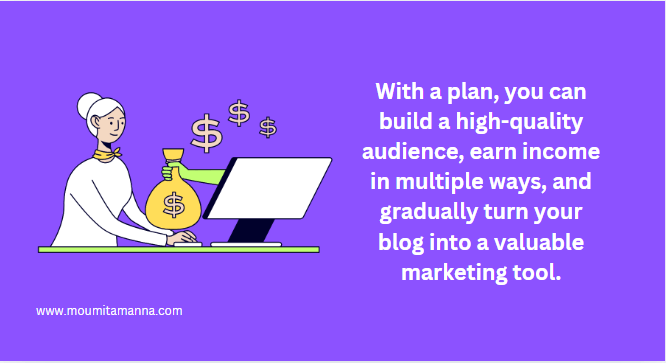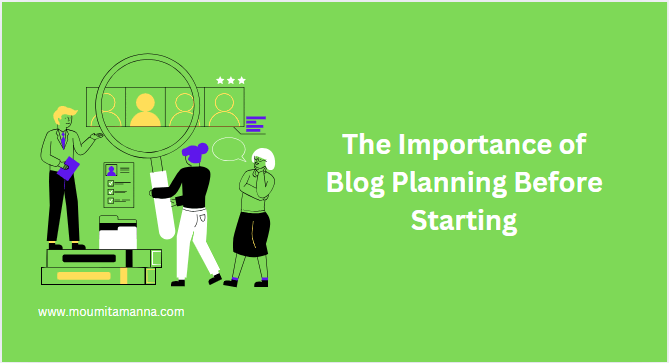Did you know that a huge number of blogs are created every day? According to popular blogging platforms, nearly 600 million blogs were created in 2024 alone, contributing to a massive volume of content posted daily. Without proper planning, achieving success is almost impossible—less than 20% of blogs succeed, while around 80% shut down within two years.
You don’t want to be among the 80% of bloggers who face early failure. Proper planning is essential before starting your blog. With the right approach, you can not only increase your chances of success but also boost your potential earnings.
Why Do Most Blogs Fail? Common Blogging Struggles
The primary reasons many blogs fail include inconsistent posting schedules and a lack of knowledge about search engine optimization (SEO). SEO is the process of optimizing your website to rank higher in search results when users look for content related to your topics.
Read: Minimum money requirement to start blogging
Here is a list of Problems That New Bloggers Often Face—And With Proper Planning, You Can Avoid Them:
- Low Engagement Rate: Engagement rate is one of the most important parameters for ranking higher.
- Inconsistency: Caused by a lack of time management and dedication, often due to insufficient planning.
- Low Traffic.
- Lack of Knowledge in Content Writing
- Lack of Knowledge in Website SEO
New blogs often face low traffic and struggle to grow their audience. You may be surprised to know that many blogs don’t get any traffic at all. The 20% of bloggers who succeed are typically those who plan ahead.
The Importance of Blog Planning Before Starting
With proper planning, you gain a clear vision of what you want to achieve from your blog. Once you know your goals, it becomes easier to figure out the steps to achieve them, keeping you motivated and helping you work consistently.
Benefits of Planning a Blog (in Brief):
1. A Clear Plan for Your Blog Helps Increase Earnings

Let’s be honest—everyone wants to make money, and if blogging is your passion, it’s essential to consider how you’ll generate income. Without a solid earning plan, it can be challenging to justify investing so much valuable time. Identifying a strategy for monetization from the start is crucial.
With a plan, you can build a high-quality audience, earn income in multiple ways, and gradually turn your blog into a valuable marketing tool.
Here are some examples of how a blog can generate income:
- An informational blog designed to earn money through ads.
- A blog used for affiliate marketing to generate income through referrals.
- A blog as a foundation for creating your own business.
- A blog through which you sell digital products.
- A blog to gather traffic and sell your training courses.
- A blog to promote your existing business online and build a global customer base.
Deciding what you want to achieve with your blog will make it easier to structure, choose relevant content types, and ultimately boost your earnings.
2. Create a Roadmap to Avoid Aimless Content Creation
With proper planning, you’ll start creating content with a clear purpose and build a community for your business or future business.
For example, you might begin by focusing on creating content purely for traffic. After reaching a certain level of traffic, you could shift to affiliate marketing. Once you’ve successfully sold affiliate products, you may decide to gradually introduce an e-commerce store, and ultimately, establish your own registered business.
Deciding on these goals in advance will help you choose content topics in a meaningful way, rather than posting aimlessly.
3. Improve Consistency by Creating a Content Calendar
Consistency is essential for success in blogging. It’s normal to face time constraints and occasionally miss your content schedule, so planning ahead is crucial.
Create a monthly content calendar and try to produce as many posts as possible during your free time. Here’s a list of elements to consider when planning your content calendar:
| Post details | Intent | Date to publish |
|---|---|---|
| Post Title | Audience (Beginner/Expert) | 13/11 |
| Primary and Secondary Keywords | User Intent | |
| Word Limit | Purpose (e.g., Gain maximum audience by creating informational content, or promote your service in a passive or direct way) |
How to Choose a Profitable Niche Based on Your Interests and Expertise
To be successful in blogging, you need to provide genuine and informative content in each post. If you choose a niche within your area of expertise, you’ll be able to write valuable content easily without feeling overwhelmed. If you don’t have a niche in your expertise, consider selecting a topic that interests you so you can enjoy learning and gathering information for your blog.
Here are the key points to consider when choosing a blog niche:
- Expertise: A niche where you have expertise (only someone with knowledge in a niche can create unique and informative content).
- Interest: A topic that genuinely interests you
- Profitability: Analyze how much other sites in the same niche are earning.
- Expansion Opportunities: Ensure there is room for growth so you can potentially turn it into a brand.
Choose a Targeted Audience When Planning Your Blog to Increase Success Probability
You should have a clear idea of who your targeted audience will be.
A blog niche can primarily attract two types of audiences:
- Audience Without Spending Capacity: The advantage is that you may have a low CPC rate once you start running ads, a low selling rate for products, and low affiliate earnings. The disadvantage is that you will likely receive comparatively more traffic.
- Audience With Spending Capacity: The advantages of having this type of audience are a high CPC rate, maximum selling potential for products, more affiliate earnings, and a high-quality audience. The disadvantage of writing on these topics is that they may be more competitive to rank for, and you may experience low traffic despite attracting a high-quality audience.
Example: If you have a blog in the “Indoor Gardening” niche and write a post on “How to Make Homemade Orchid Fertilizer,” it will likely attract visitors who may not have the purchasing power or not nterest in spending money. However, if you write a post on “How to Choose the Best Orchid Fertilizer,” you’ll attract visitors who have the spending power. This type of blog content will help you build a targeted audience for your future business and boost affiliate earnings as well.
Planning Is Important to Make Your Blog a Brand
You may often notice that some sites look like a brand and appear more professional, while others just seem like regular blogs. Professional blogs earn trust, and visitors believe they provide more genuine information compared to normal blogs. There is also a higher chance that visitors will remember the name of a professional blog and return to it whenever they need information on that topic.
What Are the Factors That Will Make Your Blog Look Professional?
- Choose a unique color scheme for your site (link color, header and footer colors, and specific colors for other sections).
- Select a professional-looking font.
- Draw inspiration from other sites in the same niche that you admire and use that to design your blog.
- Create a professional-looking logo and favicon.
A professional-looking blog has a huge impact on increasing engagement rates and building a loyal, returning audience by gaining trust and credibility.
It Is Important to Plan Your Blog’s Promotion Strategy
Creating a blog promotion strategy will give a significant boost to your blogging journey, especially in the early stages of launching your blog. There are mainly three types of marketing strategies bloggers use:
- Social Media Marketing: This is one of the most effective and easy ways to promote your blog. You can create accounts on platforms like Instagram, YouTube, Pinterest, etc., to build a community and promote your blog.
- Email Marketing: This is a powerful strategy to increase your returning audience. You should create a “Subscribe” option so visitors can sign up, allowing you to collect their emails and send future notifications.
- Sponsored Content Publishing on Other Sites: Bloggers pay other blogs in related niches to publish content that promotes their blog. These are paid posts designed to increase visibility and drive traffic.
Before starting a blog, you should familiarize yourself with these three promotion strategies to plan according to your preferences.
Advantages of Starting a Blog with a Plan
Planning helps you set clear goals for your blog’s future and strategically achieve them by creating content with purpose. Starting a blog without proper knowledge and planning increases the chances of failure, which is common among new sites.
A well-thought-out plan can boost traffic quickly, allowing you to start earning sooner. Without a plan, you may regret choosing a low-earning niche or struggle with consistency after a few months.
If you’re planning to start a blog, begin by learning about the various ways to earn money through blogging. This will help you create a blog strategy accordingly. It’s also important to prioritize learning basic SEO to ensure your blog’s success.
